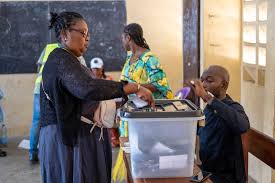THE authorities in Gabon have said that provisional results from Saturday’s presidential election – the first since the 2023 coup that ousted Ali Bongo from power
The coup mastermind Gen Brice Oligui Nguema changed the constitution to allow him to run for the presidency.
Ahead of the election, critics argued the constitution and electoral code were designed to give the military man a comfortable pathway to the top job.
The August 2023 coup brought an end to the rule by the Bongo dynasty, which had been in power for more than five decades.
Some opposition heavyweights who could have seriously challenged Oligui Nguema at the polls were excluded from the race.
Eight hopefuls are in the running to become president, with only one woman in the race – Gninga Chaning Zenaba.
Other presidential challengers include former Prime Minister Alain Claude Bilie-by-Nze, who served under the Bongo regime, as well as two stalwarts of the former ruling PDG party, Stéphane GermainIloko and Alain Simplice Boungouères.
Whoever wins the election will have the burden of ridding the country of corruption, bad governance, and other ills which characterised the Bongos’ time in power.
Why Gabon’s coup leader is bucking a trend by embracing democracy
Turn out on Saturday in some polling stations in the capital, Libreville, seemed high with long queues of voters eager to cast their ballots.
The election was largely peaceful, with some observers and candidates praising the conduct of the polls.
Earlier in the day, Oligui Nguema said the elections, which he described as transparent, would usher the country and its people into a new republic.
However, Bilie-by-Nze alleged that there were some problems at polling stations which could potentially lead to fraud.
The small oil- and timber-rich central African nation is home to just 2.5 million people. Despite its resources, about 35percent of the population still live below the poverty line of $2 (£1.50) a day.


